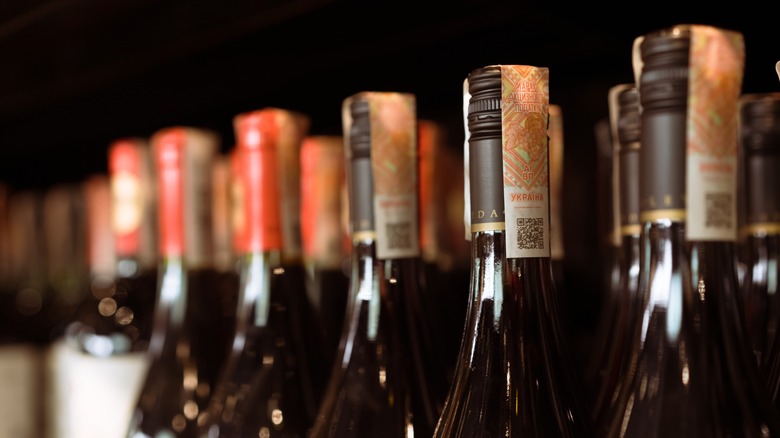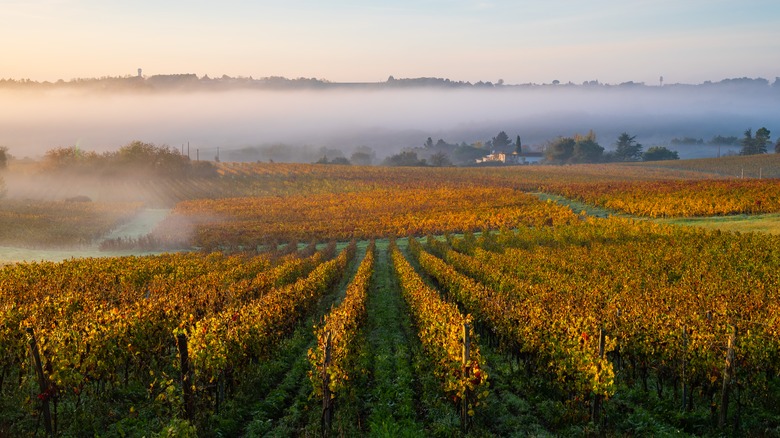How 4 Million Wine Bottles Became Involved In An Alleged Fraud
It is an unfortunate reality that wine fraud is nothing new. One of the biggest scandals in living memory is that of forger Rudy Kurniawan, who amassed a multimillion-dollar fortune selling rare, vintage wines in the early to mid-2000s. The thing was, just about every bottle Kurniawan sold was fake, according to The Guardian. The subject of Kurniawan's treachery was explored in-depth in the documentary "Sour Grapes," which showed just how much his forgeries affected the wine world.
Now, we are at it again. A trial is currently underway in France against five parties allegedly involved in tampering with, transporting, and selling 4 million bottles of fake Bordeaux wine, per Food & Wine – and details are emerging that make this scandal the stuff of Hollywood. It all began with a bad 2013 grape harvest. The season had been rough, and the financial outlooks for the year were looking grim. The story goes that, allegedly, one broker decided to do something radical to cover losses: import cheap wine from Spain and pass it off as Bordeaux.
The process involved so many steps that by the end, multiple parties, from French winemakers to brokerages, all had an alleged hand in the conspiracy.
Birth of a wine fraud ring
So, how exactly did this whole thing work? Allegedly — boy, we're using that word a lot — a wine merchant would purchase cheap wine from Spain. Then, according to Food & Wine, that wine was transported to a second party, located in the Bordeaux region, who would doctor the transport documents to make it look like a French rather than Spanish shipment — allowing the bottles to be passed on to an associate of the wholesaler Celliers Vinicoles du Blayais (the alleged ringleader) and distributed as genuine Bordeaux without raising any eyebrows.
The fraud ring, which purportedly operated for a total of around six years, is said to have run what amounts to 4.6 million bottles of cheap Spanish wines through its convoluted scheme, according to Food & Wine, garnering nearly $4 million by peddling the newly labeled bottles as anything from ordinary dinner wine to more sought-after Bordeaux titles. The trial, which kicked off last week, is well underway in France.
The trial and regional impact
The prosecution brings charges against five different parties due to the number of discrete steps involved that culminated in "an absolute record in the region, a fraudulent scheme on an industrial scale," in the words of the lawyer for the Federation des Grands Vins de Bordeaux, one of the parties seeking restitution according to local news outlet France Bleu.
Meanwhile, the defense is citing the multiple steps of the scheme as absolution; the French merchant who originally purchased the wine maintains that they were oblivious to the fraud and purchased the product with the intention of selling it for what it was — cheap Spanish wine. It was in the hands of subsequent parties, they insist, that the product was converted from inexpensive Spanish wine into in-demand French wine, reports Food & Wine. We'll see if this holds water; the defendants could face up to seven years in prison if convicted.
As for the region of Bordeaux, officials are worried about how this case will affect its reputation — a far-reaching consequence that, representatives of civil parties to the case noted, could damage the livelihoods of large organizations as well as peasant farmers, per France Bleu. Judgment on the accused fraudsters is expected to come down in January of 2023.


